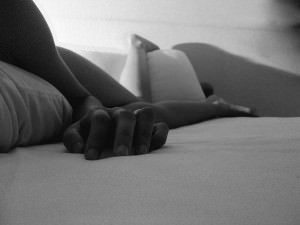In layman’s terms, menopause is that part of a woman’s life that she stop menstruating or receiving her periods. Scientifically, it is the stage in which the ovaries stop producing estrogen and progesterone. Studies on menopause and sleep show that changes that occur at this stage can lead to sleep problems.

Menopause and sleep studies show that close to 61% of women at this stage experience insomnia and other sleep problems. Menopause usually occurs at any age between 45 and 50. It is considered abnormal if it occurs before that age of 40.
Menopause and Sleep: Hot Flashes
Research on menopause and sleep done by the National Sleep Foundation shows that about 75%-85% menopausal women experience hot flashes. Hot flashes is a sudden feeling of warmth accompanied by sweating and quickly spreads throughout the body. As bedtime approached body temperature lowers in preparation for sleep, hot flashes increase body temperature thus disrupting sleep. Most women experience hot flashes for a period of one year though 25% of them have hot flashes for more than 5 years. Menopause and sleep problems experts say that the following tips are useful in easing the hot flashes:
- Wear loose clothes as you go to bed. Prefer wearing clothes made from natural fibers such as cotton which is highly absorbent.
- You sleep environment should be well ventilated at night. During the day, the windows should be opened to allow fresh air to circulate.
- Your diet should be devoid of certain foods cause sweating and increase in body temperature. These foods are primarily spices such as garlic and hot pepper.
- Food rich is soy are known to ease hot flashes.
Menopause and Sleep: Hormone Replacement Therapy
Research on menopause and sleep disorders shows that Hormone Replacement Therapy (HRT) can help to ease the hot flashes and insomnia. HRT can be administered through pills, patches, gels, creams or injections. HRT aims at replacing the hormones estrogen and progesterone whose production continuously decreases with time. However, the long term effect of HRT is unknown and is though to predispose women to:
- Breast cancer.
- Heart diseases.
- Blood clots.
- Stroke.
Menopause and sleep experts recommend that HRT should only be used for a short time to ease severe sleep disorders in menopause. In addition, only the lowest possible dose should be prescribed under supervision by a doctor.
- Menopausal women should as much as possible try to maintain normal sleep and waking up time.
- Exercise should be avoided about 5 hours before going to bed.
- All drinks that are caffeinated or contain alcohol should be avoided at least in the second half of the day.
- Use plant estrogens that are sold over-the-counter as food supplements- these alternatives are made from ginseng, red clover and black cohosh.
- Most menopause and sleep problems are caused by stress. It is therefore advisable to learn relaxation techniques. Massage and yoga are helpful here.
Menopause and Sleep Apnea
The relationship between menopause and sleep apnea is well known. The prevalence of sleep apnea is high among menopausal women. Sleep apnea is short interruption in breathing that occurs during sleep. Sleep apnea interrupts sleep and increases the frequency of waking up at night.
